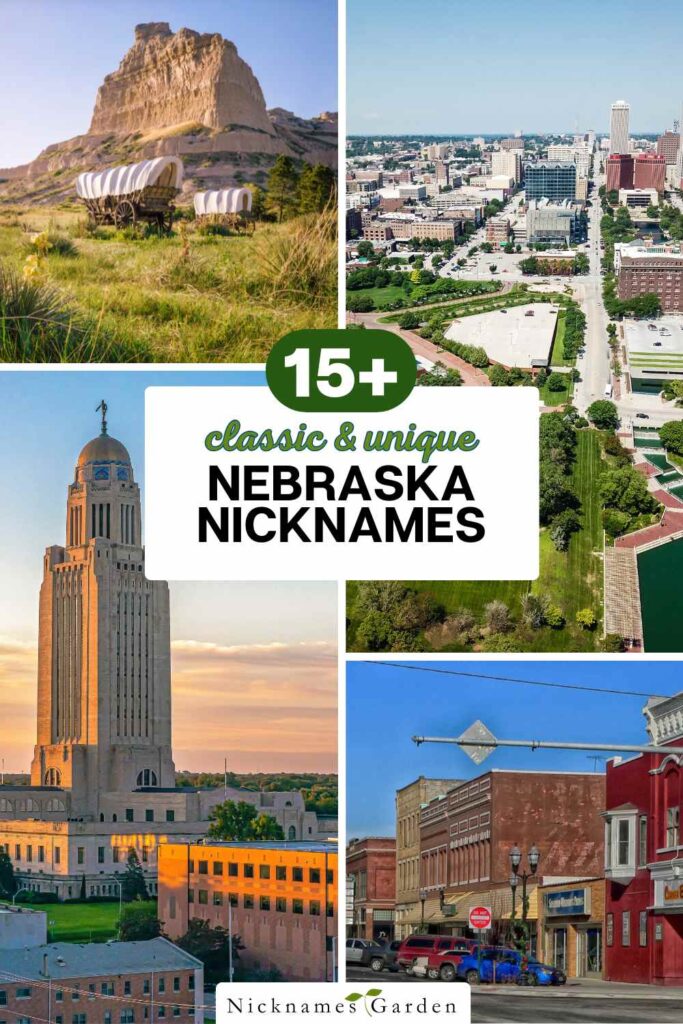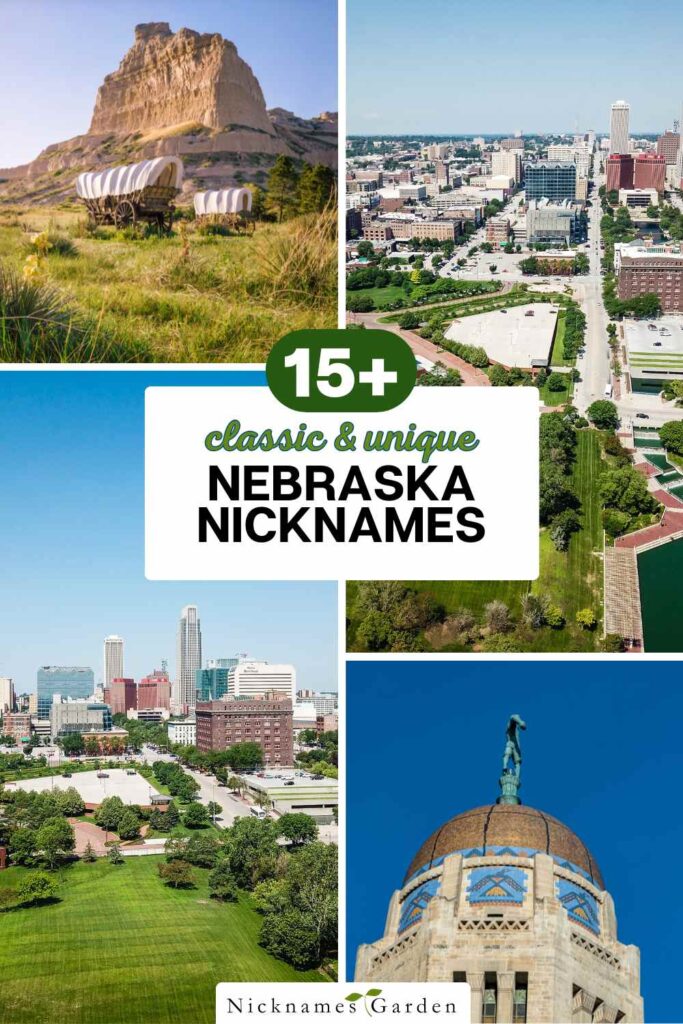Nebraska, rich in history and culture, boasts a variety of nicknames.
From “The Cornhusker State” to “The Good Life State,” discover the fascinating origins and meanings behind these monikers that capture the essence of Nebraska.
Official Nicknames of Nebraska
The Cornhusker State
Meaning and Origin
- The nickname “The Cornhusker State” originates from the University of Nebraska’s athletic teams, known as the Cornhuskers.
- Cornhusking, the process of removing the husks from ears of corn, was a common agricultural activity in Nebraska.
- The term “Cornhusker” replaced the earlier nickname, “The Bugeaters,” in the early 1900s.
Historical Significance
- Nebraska’s agricultural heritage, particularly its corn production, played a pivotal role in adopting this nickname.
- The name reflects the state’s pride in its agricultural prowess and the hardworking spirit of its people.
Impact on State Identity and Culture
- The Cornhusker nickname is deeply embedded in Nebraska’s identity, symbolizing its strong agricultural roots and community values.
- The University of Nebraska’s sports teams have popularized the term, making it synonymous with state pride and unity.
- Festivals, events, and local businesses often incorporate “Cornhusker” in their names, further reinforcing the nickname’s significance.
The Tree Planters’ State
Meaning and Origin
- “The Tree Planters’ State” nickname honors Nebraska’s contribution to environmental conservation through the establishment of Arbor Day.
- J. Sterling Morton, a Nebraska City resident, founded Arbor Day in 1872, encouraging tree planting to improve the environment.
Connection to Arbor Day
- Arbor Day, celebrated annually on the last Friday in April, originated in Nebraska and has since become a national observance.
- The first Arbor Day led to the planting of over one million trees in Nebraska.
Contributions to Environmental Conservation
- The Tree Planters’ State nickname highlights Nebraska’s commitment to environmental stewardship and sustainability.
- The state continues to promote tree planting and conservation efforts, reflecting the enduring legacy of Arbor Day and its founder.
By exploring these official nicknames, we gain insight into Nebraska’s history, culture, and values. “The Cornhusker State” and “The Tree Planters’ State” encapsulate the state’s agricultural heritage and environmental consciousness, forming an integral part of Nebraska’s identity.
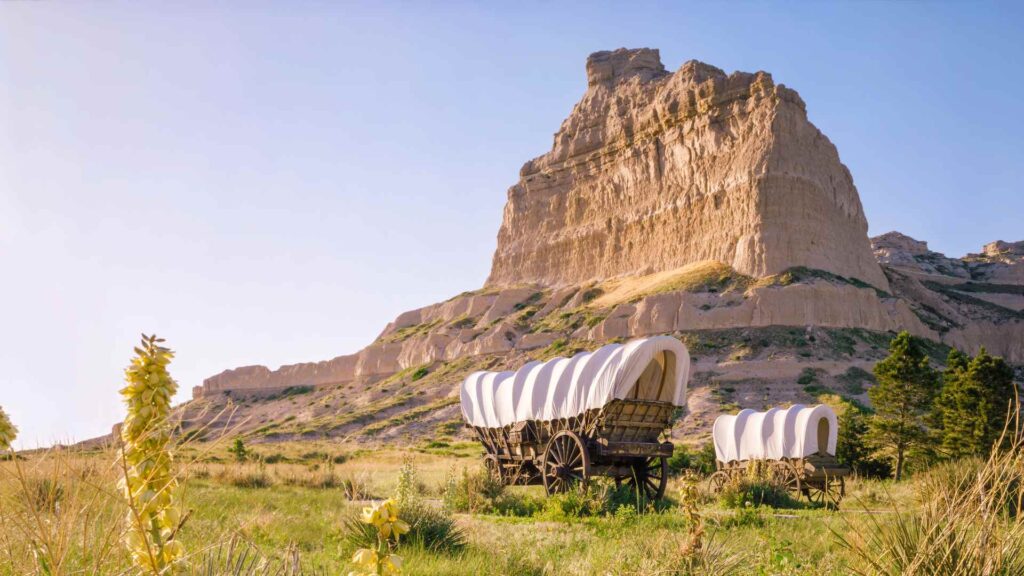
Historical Nicknames
The Beef State
Origin and Meaning
- The nickname “The Beef State” reflects Nebraska’s significant role in cattle ranching and beef production.
- This nickname emerged in the mid-20th century when Nebraska’s beef industry was booming, making it a major economic driver for the state.
Nebraska’s Role in Cattle Ranching and Beef Production
- Nebraska is one of the top states in the United States for cattle production, with its vast prairies providing ideal grazing land.
- The state’s economy has historically relied heavily on beef production, contributing significantly to local and national markets.
- Key cities like Omaha and Grand Island became central hubs for meatpacking and beef processing industries.
Influence on State Economy and Culture
- The beef industry has shaped Nebraska’s economy, providing jobs and supporting local communities.
- Cultural events such as cattle auctions, rodeos, and beef festivals celebrate this aspect of Nebraska’s heritage.
- The prominence of beef in local cuisine, with dishes like steaks and burgers being particularly popular, reflects this nickname’s cultural impact.
The Bugeater State
Origin and Meaning
- “The Bugeater State” is one of Nebraska’s older nicknames, dating back to the late 19th century.
- The term “bugeater” was originally used to describe the early settlers and farmers who battled insects that plagued their crops.
Historical Context and Significance
- In the 1800s, Nebraska was a frontier state with settlers facing numerous challenges, including swarms of insects that threatened their livelihoods.
- This nickname emerged as a somewhat humorous yet respectful nod to the resilience and determination of Nebraska’s pioneers.
- The University of Nebraska’s football team was initially known as the “Bugeaters” before adopting the “Cornhuskers” name in the early 1900s.
Transition to Modern Nicknames
- As Nebraska evolved and its agricultural practices improved, the “Bugeater” nickname fell out of common use.
- The adoption of “The Cornhusker State” better reflected the state’s thriving corn production and agricultural success.
- Despite its decline, “The Bugeater State” remains a fascinating part of Nebraska’s historical tapestry, symbolizing the hardships and triumphs of its early settlers.
These historical nicknames, “The Beef State” and “The Bugeater State,” offer a glimpse into Nebraska’s past, highlighting its agricultural foundations and the resilience of its people. They provide a rich context for understanding how the state has evolved over time and the legacy of its early inhabitants.
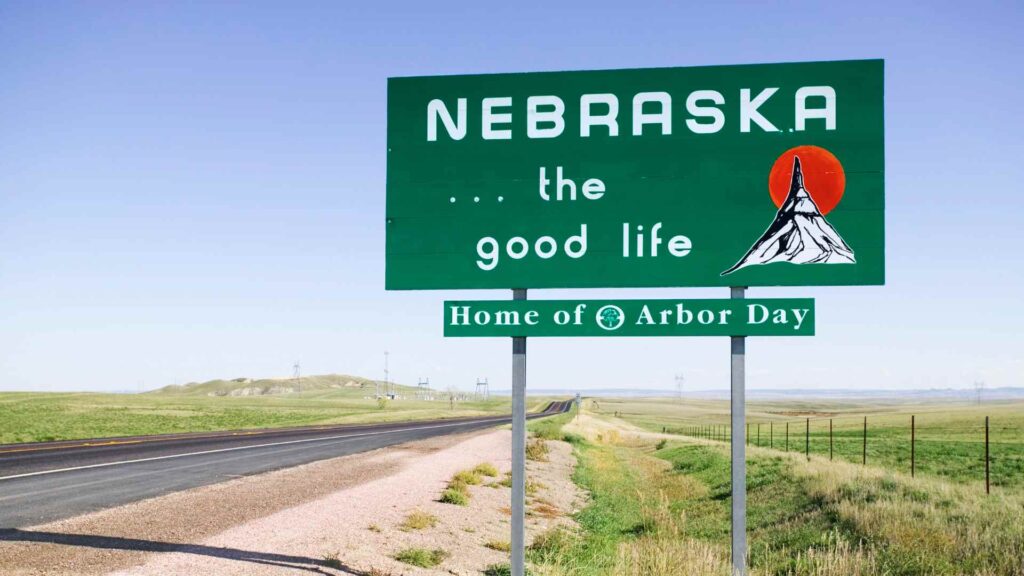
Geographical and Regional Nicknames
Midland State
Meaning and Origin
- The nickname “Midland State” reflects Nebraska’s central location within the United States.
- Geographically, Nebraska is situated in the heart of the country, often considered the midpoint of the continental United States.
Geographical Significance
- Nebraska’s central position has made it a crucial transportation and logistics hub, connecting the east and west coasts.
- Major highways and railroads traverse the state, reinforcing its role as a vital crossroads for commerce and travel.
Cultural Impact
- The Midland State nickname underscores Nebraska’s identity as a central player in the nation’s geography and economy.
- It symbolizes the state’s accessibility and its importance in facilitating the movement of goods and people across the country.
The Great Plains State
Meaning and Origin
- “The Great Plains State” nickname is derived from Nebraska’s expansive prairies and plains, which dominate its landscape.
- The Great Plains region, known for its flat terrain and grassy fields, stretches across several states, with Nebraska being a significant part of it.
Geographical and Ecological Context
- The Great Plains are characterized by vast open spaces, fertile soil, and a climate suitable for agriculture.
- Nebraska’s prairies support diverse ecosystems, including native grasses, wildflowers, and various wildlife species.
Importance to State Identity
- The Great Plains State nickname highlights Nebraska’s natural beauty and its role in the broader Great Plains region.
- It emphasizes the state’s agricultural heritage, with farming and ranching being central to its economy and way of life.
- The open landscapes inspire a sense of freedom and connection to nature, which is a key aspect of Nebraska’s identity.
The Blackwater State
Meaning and Origin
- “The Blackwater State” nickname refers to Nebraska’s significant river systems, particularly the Platte River, which was historically known as the Black Water by Native American tribes.
Connection to Nebraska’s Rivers and Water Bodies
- Nebraska is home to several important rivers, including the Platte, Missouri, and Niobrara, which have shaped the state’s geography and development.
- These rivers have provided essential resources for agriculture, transportation, and settlement throughout Nebraska’s history.
Cultural and Historical Significance
- The Blackwater State nickname pays homage to the state’s waterways, which have been vital for the survival and prosperity of its inhabitants.
- Rivers like the Platte have historical significance, serving as routes for pioneers and settlers during westward expansion.
These geographical and regional nicknames—Midland State, The Great Plains State, and The Blackwater State—capture the essence of Nebraska’s landscape and its central role in the United States. They highlight the state’s natural features, strategic location, and the historical importance of its waterways.
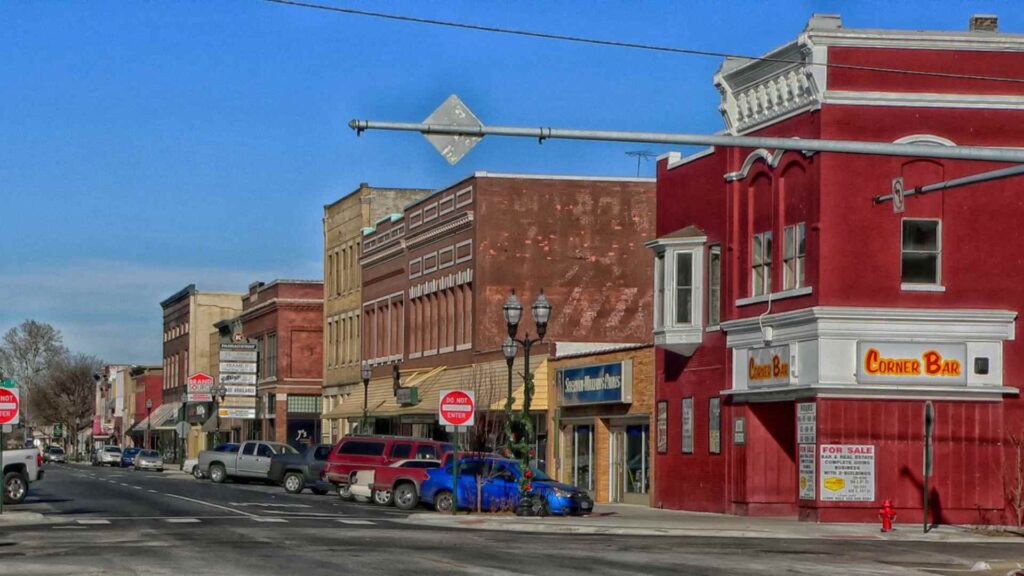
Cultural and Lifestyle Nicknames
The Good Life State
Meaning and Origin
- “The Good Life State” nickname reflects the high quality of life enjoyed by Nebraska’s residents.
- The phrase was adopted as the state’s official slogan in the 1980s, emphasizing the positive aspects of living in Nebraska.
Reflection of Nebraska’s Quality of Life
- Nebraska is known for its low cost of living, strong sense of community, and excellent educational and healthcare systems.
- The state offers a balanced lifestyle with ample recreational opportunities, from outdoor activities to cultural events.
Promotion and Impact
- The Good Life State slogan has been used in marketing campaigns to attract tourists, businesses, and new residents.
- It conveys a sense of pride and satisfaction among Nebraskans, promoting the state as a desirable place to live and work.
Home of Arbor Day
Meaning and Origin
- Nebraska is recognized as the “Home of Arbor Day” because it is where the tree-planting holiday originated.
- J. Sterling Morton, a Nebraska City resident, founded Arbor Day in 1872 to encourage tree planting and environmental stewardship.
Importance of Arbor Day in Nebraska’s Culture
- Arbor Day has become a significant cultural event, with communities across the state participating in tree-planting activities.
- The Arbor Day Foundation, headquartered in Nebraska City, continues to promote tree planting and conservation efforts globally.
Cultural Legacy
- The Home of Arbor Day nickname highlights Nebraska’s commitment to environmental conservation and its role in starting a worldwide movement.
- The state’s dedication to tree planting and sustainability is celebrated annually, reinforcing the importance of caring for the environment.
Nebraska Nice
Meaning and Origin
- The nickname “Nebraska Nice” reflects the friendly, welcoming nature of Nebraskans.
- It originated from the state’s reputation for hospitality and the genuine kindness of its residents.
Representation of Nebraskan Hospitality and Friendliness
- Nebraskans are known for their politeness, helpfulness, and community spirit.
- Visitors to the state often comment on the warm and friendly interactions they experience, reinforcing the Nebraska Nice image.
Cultural Impact
- Nebraska Nice is more than just a slogan; it is a way of life that emphasizes the importance of treating others with respect and kindness.
- The nickname has been embraced in tourism campaigns, community initiatives, and everyday interactions, promoting a positive and welcoming image of the state.
These cultural and lifestyle nicknames—The Good Life State, Home of Arbor Day, and Nebraska Nice—capture the essence of what makes Nebraska a special place to live.
They highlight the state’s commitment to quality of life, environmental stewardship, and the warm, welcoming nature of its residents.
Nicknames Based on Cities and Regions
Omaha – The Gateway to the West
Meaning and Origin
- Omaha’s nickname, “The Gateway to the West,” originates from its historical role as a key departure point for westward expansion during the 19th century.
- The city’s strategic location along the Missouri River made it a critical hub for pioneers, traders, and settlers moving west.
Historical and Cultural Significance
- Omaha was the starting point for the Lewis and Clark Expedition and later became a major stop for travelers on the Oregon, California, and Mormon Trails.
- The city’s Union Pacific Railroad, established in the 1860s, further solidified Omaha’s role as a transportation and logistics center.
Modern-Day Impact
- Today, Omaha celebrates its historical significance with various museums, cultural events, and landmarks dedicated to its pioneer heritage.
- The nickname “Gateway to the West” remains a point of pride for residents and is prominently featured in the city’s branding and tourism efforts.
Lincoln – The Star City
Meaning and Origin
- Lincoln, Nebraska’s capital, is known as “The Star City” due to its significance as the political and cultural heart of the state.
- The nickname also alludes to the city’s historical ties to the Union during the Civil War, symbolized by the star on the state flag.
Significance as the State Capital
- As the capital city, Lincoln is home to Nebraska’s government institutions, including the state capitol building, which is an architectural landmark.
- The city also hosts the University of Nebraska-Lincoln, contributing to its vibrant cultural and academic atmosphere.
Cultural and Economic Influence
- Lincoln’s cultural scene is rich with museums, theaters, music venues, and festivals, making it a focal point for arts and entertainment in Nebraska.
- The nickname “Star City” reflects the city’s shining role in the state’s identity and its continuous growth and development.
Kearney – The Heart of Nebraska
Meaning and Origin
- Kearney is referred to as “The Heart of Nebraska” due to its central location within the state.
- Situated almost equidistant from the eastern and western borders, Kearney serves as a literal and figurative midpoint in Nebraska.
Central Location and Importance
- Kearney’s central position has made it an important transportation and commerce hub, particularly for travelers along Interstate 80.
- The city hosts the annual Nebraska State Fair, attracting visitors from across the state and highlighting its role as a gathering place.
Community and Cultural Impact
- The nickname “The Heart of Nebraska” emphasizes Kearney’s welcoming community spirit and its significance in the state’s social and economic landscape.
- Local attractions such as the Museum of Nebraska Art and the Great Platte River Road Archway Monument celebrate the city’s cultural and historical importance.
These city and regional nicknames—Omaha as “The Gateway to the West,” Lincoln as “The Star City,” and Kearney as “The Heart of Nebraska”—highlight the unique roles these cities play in the state’s history, culture, and identity.
They provide a deeper understanding of how these urban centers contribute to the overall character of Nebraska.
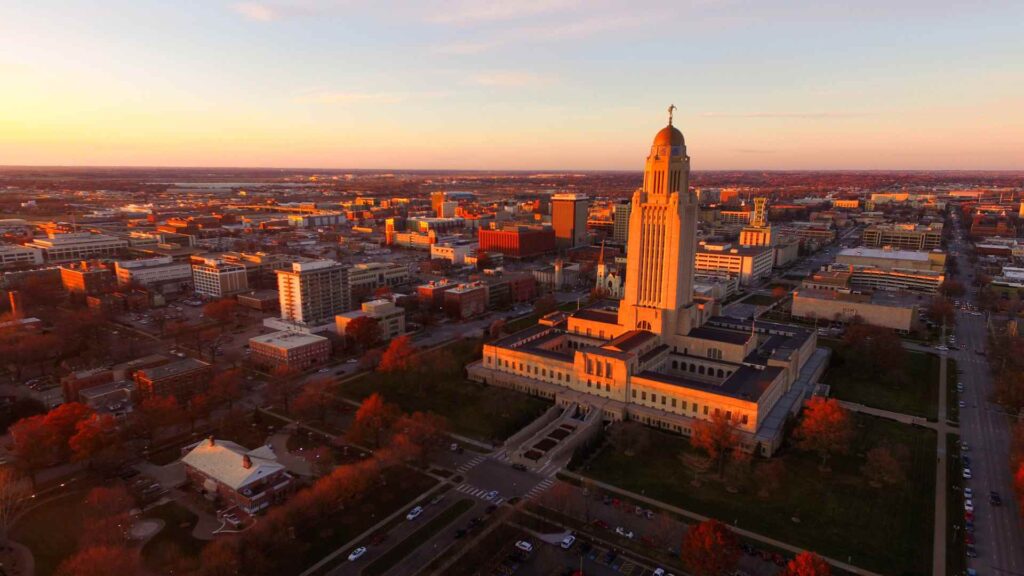
Sports-Related Nicknames
Huskers
Origin and Meaning
- The nickname “Huskers” is derived from the term “Cornhuskers,” which originally described the process of harvesting corn by removing its husks.
- This name was adopted by the University of Nebraska’s athletic teams in the early 1900s, replacing the former name “Bugeaters.”
Association with University of Nebraska Athletics
- The University of Nebraska’s teams, particularly the football team, are widely known as the “Huskers” or “Cornhuskers.”
- The term embodies the agricultural heritage and hardworking spirit of Nebraska, reflecting the values of perseverance and dedication.
Impact on State Pride and Culture
- The Huskers have become a central symbol of state pride, with the football team enjoying a passionate fan base known for their loyalty and enthusiasm.
- Game days in Lincoln are significant events, drawing large crowds and fostering a strong sense of community and state pride.
- The success and popularity of the Huskers have helped to promote Nebraska on a national scale, enhancing the state’s visibility and reputation.
Big Red
Origin and Meaning
- “Big Red” is a nickname often used interchangeably with “Huskers” to describe the University of Nebraska’s sports teams.
- The name refers to the team’s official colors, red and white, which are prominently featured in their uniforms and fan apparel.
Significance in Nebraska Sports Culture
- The term “Big Red” evokes images of strength, unity, and power, qualities that fans and players alike embrace.
- It is commonly used in chants, slogans, and cheers, such as the famous “Go Big Red!” heard during games and sporting events.
Cultural and Community Impact
- “Big Red” has become more than just a nickname; it represents the collective spirit and identity of Nebraska’s sports fans.
- The nickname is widely recognized across the state and country, symbolizing the pride and passion that Nebraskans have for their teams.
- Merchandise, media coverage, and marketing campaigns frequently use “Big Red,” further embedding it into the cultural fabric of Nebraska.
These sports-related nicknames, “Huskers” and “Big Red,” are integral to the identity of Nebraska’s athletic community.
They reflect the state’s agricultural roots, embody the values of hard work and perseverance, and serve as rallying cries for fans who support their teams with unwavering loyalty. Through these nicknames, the spirit of Nebraska is brought to life, both on and off the field.
Nicknames from Indigenous Heritage
Omaha Tribe Influence
Meaning and Origin of Related Nicknames
- The Omaha Tribe, indigenous to the region that is now Nebraska, has greatly influenced local culture and place names.
- Many geographical features, cities, and institutions in Nebraska bear names derived from the Omaha language and heritage.
Cultural Significance
- The city of Omaha itself is named after the Omaha Tribe, reflecting the tribe’s historical presence and influence in the area.
- The term “Omaha” means “Dwellers on the Bluff,” highlighting the tribe’s connection to the land and its geographical features.
Legacy and Influence
- The influence of the Omaha Tribe is seen in various local traditions, festivals, and educational programs that honor indigenous culture.
- Efforts to preserve and promote the Omaha language and traditions continue, emphasizing the importance of the tribe’s contributions to Nebraska’s history and identity.
Ponca Tribe Influence
Meaning and Origin of Related Nicknames
- The Ponca Tribe, another significant indigenous group in Nebraska, has also left a lasting impact on the state’s culture and place names.
- Various locations and landmarks in Nebraska are named in honor of the Ponca Tribe and its leaders.
Cultural Significance
- The city of Niobrara, named after the Ponca word for “running water,” reflects the tribe’s connection to the Niobrara River.
- The legacy of Chief Standing Bear, a prominent Ponca leader, is celebrated for his role in civil rights and advocacy for Native American rights.
Legacy and Influence
- The story of Chief Standing Bear and his fight for justice is a significant part of Nebraska’s history, symbolizing the broader struggle for indigenous rights and recognition.
- The Ponca Tribe’s influence is preserved through cultural centers, historical markers, and educational initiatives that promote understanding and appreciation of their heritage.
These nicknames and influences from the Omaha and Ponca Tribes highlight the deep-rooted indigenous heritage that is an integral part of Nebraska’s identity.
They reflect the enduring legacy of these tribes, their connection to the land, and their contributions to the state’s cultural and historical landscape.
Through the recognition and celebration of these indigenous influences, Nebraska acknowledges and honors the rich tapestry of its diverse heritage.
Agricultural and Natural Resource Nicknames
The Breadbasket
Meaning and Origin
- The nickname “The Breadbasket” signifies Nebraska’s role as a major producer of agricultural goods, particularly grains.
- This term highlights the state’s fertile soil and favorable climate, which make it ideal for growing crops such as wheat, corn, and soybeans.
Importance of Agriculture in Nebraska’s Economy
- Agriculture is the backbone of Nebraska’s economy, with farming and ranching being primary industries.
- The state is a leading producer of several key crops, contributing significantly to both national and global food supplies.
Cultural Impact
- The Breadbasket nickname underscores the pride Nebraskans take in their agricultural heritage and the hard work of farmers.
- Agricultural fairs, festivals, and events celebrate this aspect of the state’s identity, fostering a sense of community and tradition.
- The nickname also emphasizes the importance of sustainability and innovation in farming practices to maintain Nebraska’s status as a vital agricultural hub.
The Cattle State
Meaning and Origin
- “The Cattle State” reflects Nebraska’s prominence in cattle ranching and beef production.
- This nickname acknowledges the significant role that cattle farming plays in the state’s economy and cultural landscape.
Role in Beef Production
- Nebraska is one of the top cattle-producing states in the U.S., with vast ranches and feedlots spread across its plains.
- The state’s beef industry is a major economic driver, providing jobs and supporting local businesses.
Cultural Significance
- The Cattle State nickname highlights the deep connection between Nebraskans and their ranching heritage.
- Rodeos, livestock shows, and county fairs are popular events that celebrate the state’s cattle industry and rural way of life.
- The prominence of beef in local cuisine, including Nebraska’s famous steaks, reflects the state’s identity as a leading beef producer.
These agricultural and natural resource nicknames—The Breadbasket and The Cattle State—emphasize Nebraska’s vital role in feeding the nation and the world.
They highlight the state’s agricultural prowess, the importance of sustainable farming practices, and the cultural significance of farming and ranching to Nebraska’s identity.
Through these nicknames, the contributions of Nebraska’s farmers and ranchers are celebrated and recognized as essential to the state’s heritage and future.
Conclusion
Nebraska’s rich tapestry of nicknames tells a multifaceted story of its history, culture, geography, and community spirit.
From “The Cornhusker State,” celebrating the state’s agricultural heritage, to “The Good Life State,” highlighting the quality of life enjoyed by its residents, each nickname offers a unique glimpse into what makes Nebraska special.
These nicknames, whether derived from its indigenous roots, historical milestones, or modern-day achievements, encapsulate the essence of Nebraska.
They reflect the state’s commitment to environmental stewardship, as seen in “The Tree Planters’ State,” and its significant contributions to the nation’s food supply, as highlighted by “The Breadbasket.”
